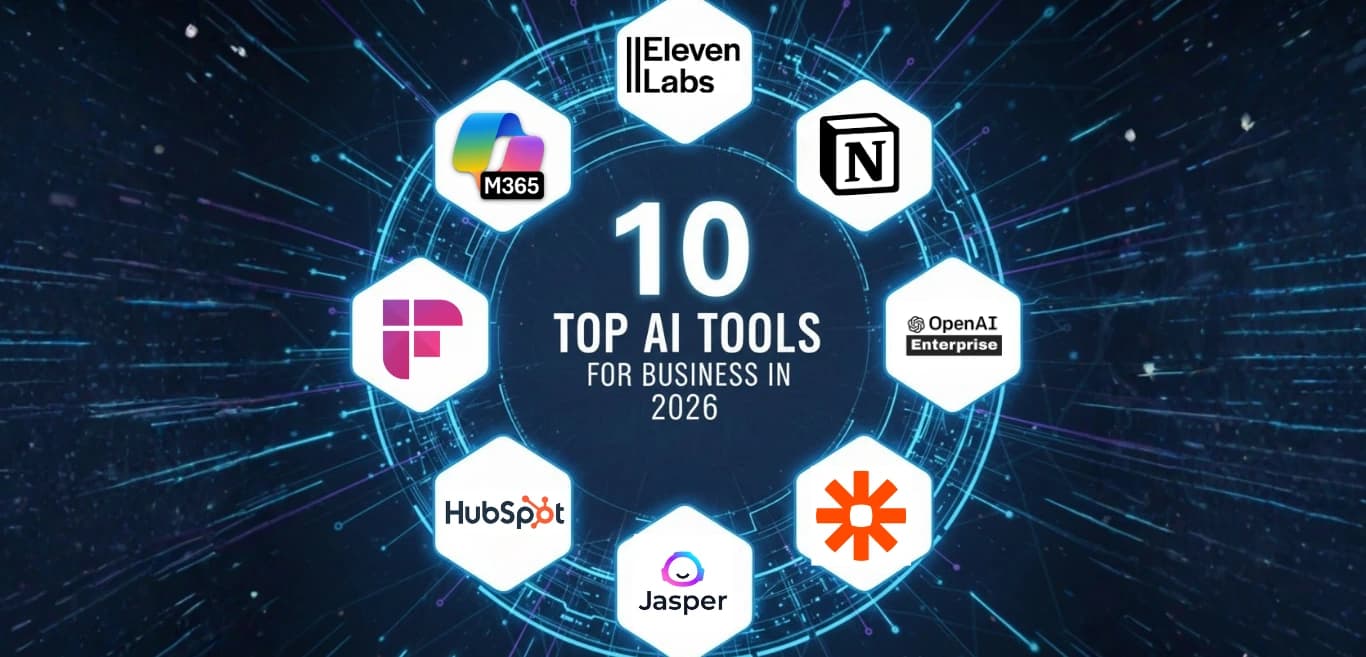The marketing function of a company can significantly benefit from the use of artificial intelligence (AI). To match products or services to customer needs and persuade clients to buy, the technology has the potential to make a significant difference.
A recent paper by the Harvard Business Review says while AI has made inroads in marketing, it is expected to take on "larger and larger roles across the function in the coming years."
One area where AI can be utilized to its optimum is in customer service. Businesses that include customer service in their company goals should incorporate AI into their strategies to improve the customer experience.
AI tools can be found online and used to encourage interaction with customers while they browse sites or apps.
These kinds of tools are becoming more commonplace and can lead to improved analytics for businesses regarding user behavior and satisfaction scores from surveys or other direct feedback methods.
Thus, artificial intelligence, or its subset, machine learning (ML), can be used to enhance customer experience by providing timely information, predictive capabilities, accurate knowledge, and effective customer service.
The technology can also be used to improve the overall customer experience of delivering information on demand.
What is Artificial Intelligence? A Brief Introduction
A digital computer or a computer-controlled robot that is capable of performing tasks typically associated with intelligent beings is referred to as artificial intelligence (AI).
It is often used to describe the development of systems that are endowed with the cognitive processes characteristic of humans, such as reasoning, discovering meaning, generalizing, or learning from past experiences.
There are several ways to classify the various types of artificial intelligence. The first category is based on what the AI learns from its observations. This subset, called machine learning, learns either through supervised learning or unsupervised learning.
Supervised learning involves a human trainer who provides feedback to the AI as it learns and improves.
Unsupervised learning is where the AI is left to learn from its own observations. Another category is based on how the AI can interact with its environment. In this category, the AI may have the ability to use sensors or gather information from other sources, such as the Internet.
Another classification is whether it must be human-in-the-loop or whether it can operate independently. The supervisory classification of artificial intelligence is based on the feedback that an AI receives from its trainers, either human or computer-based.
Looking for Marketing Insights to Improve Customer Loyalty? >>>> Read more
How can Artificial Intelligence (AI) Change Customer Experience?
AI in Customer Experience: One of the most obvious ways that artificial intelligence can change the customer experience is by automating routine tasks that would traditionally require human interaction.
For example, a customer service representative could utilize AI to answer common questions or automatically schedule appointments.
This would free up the representative to provide more personalized service. Of course, artificial intelligence must have a record of the customer's preferences to ensure that the agent does not attempt to do something unexpected or inappropriate.
In the hospitality industry, for example, AI can help answer questions posed by potential customers and book reservations, while also addressing inquiries from existing customers.
In other industries, such as healthcare, AI can be leveraged to provide valuable feedback to patients. The patient can then use this feedback to make informed decisions about how they want to treat their symptoms.
At the current rate of advancement, this will soon be commonplace in the industry. In fact, many larger companies have already deployed AI technology to supplement their customer service team.
Not only do these large companies benefit from the use of AI technology, but their customers also do.
With AI technology, companies will be able to provide faster service to customers and offer more accurate, personalized recommendations.
Artificial Intelligence (AI) in Customer Segmentation
All marketing activities depend on segmenting target groups. Today, the combination of AI (Artificial Intelligence) and predictive analytics can add a very high degree of "smartness" to digital marketing.
Marketers can precisely identify the best target group. Obviously, without knowing who you are trying to reach, it is tough for a marketer to persuade the consumer.
The use of AI in customer segmentation is also more accurate and faster – it can reveal segments within this group that share similar characteristics.
Through this approach, customers can offer their customers a more personalized offer, creating a unique, personal bond that would be difficult to develop without the help of artificial intelligence.
Furthermore, AI can identify the target group. Today's consumers are increasingly becoming more responsible when buying products and services. Using artificial intelligence, customers can be identified as individuals, in which case they will find more relevant information.
Those who are likely to buy can be found before they make a purchase, saving time and money.
Artificial Intelligence (AI) in Online Shopping
Artificial intelligence can add several benefits to online shopping, especially those that involve predictive analysis. Customers can use applications that predict which products will appeal to consumers, a service that is challenging for traditional retailers to achieve.
It is also possible to predict the popularity of products based on trends, such as determining which products tend to have the highest sales. This would enable online retailers to refine their product catalogs, ensuring that customers purchase the most suitable products.
Such features enable customers to access their products and services using various tools, including virtual assistant services and chatbots. Such systems analyze users' behavior and adjust services accordingly.
Additionally, it is possible to run an automated sales process that can be used to sell products without any human intervention.
Artificial Intelligence Tools for Enhancing Customer Experience
Artificial intelligence tools are being increasingly used to enhance the customer experience. These tools can interpret customer data to identify needs and preferences. They can also provide personalized recommendations and solutions.
This enables businesses to provide a more personalized experience for their customers. It also helps them understand the different stages a customer goes through as they use their products or services.
AI is widely used today to simplify processes, increase efficiency, and reduce errors. The mathematical calculations are done with the help of highly advanced and powerful software.
These calculations help businesses gain a better understanding of their customers' needs and can provide them with the correct answers. In this way, companies can understand their customers' needs and create the right content for them.
For example, an AI tool can help a business know whether its customers are looking for a new product to buy. Or it can help a company understand which products they should provide. It can also be used to assess the impact of changes to their product and services on customers.
Benefits of Using Artificial Intelligence for Customer Experience
Artificial intelligence offers numerous benefits for enhancing customer experience. As we mentioned earlier in this post, AI can help companies better understand their customers, provide more personalized service, and make it easier for customers to find what they need.
Benefits of AI in Customer Experience
Companies using artificial intelligence have access to data from their customers within their systems, enabling them to understand the customer and make improvements to the customer experience. Customer experience involves a variety of factors that AI can analyze.
These factors can include aspects such as internet usage, personal data, and preferences that may help companies better understand their customers. This information can then be used to provide more effective services, such as suggesting items based on the customer's preference or predicting items that are likely to be needed in the future.
Customer experience encompasses the entire customer lifecycle, from the initial visit to a website or interaction with a salesperson to the final purchase or departure from a store. This means that artificial intelligence can be utilized to deliver enhanced services throughout the customer lifecycle.
There are many benefits of using AI in the customer experience. Some of these benefits are:
- Using algorithms and intelligent systems, businesses can predict what customers might need, such as the next item in a shopping cart or which products are most likely to win customer loyalty.
- This saves businesses time and money because they no longer have to gather customer data for every single user.
- Using AI, businesses can also track customers' actions and preferences over an extended period. This can enable them to target ads at their most likely customers.
- Moreover, using AI to target ads could mean that businesses will be able to obtain customers' approval before initiating the advertising process.
- AI can do more than improve the customer experience and increase the likelihood of receiving a positive response from customers. It can also help businesses save a lot of money.
Looking for Marketing Insights to Improve Customer Loyalty? >>>> Read more
Challenges of Using Artificial Intelligence for Customer Experience
Artificial intelligence is one of the most promising technologies for customer experience. It has the potential to make interactions more personalized and efficient. However, several challenges need to be addressed before it can be widely used.
One challenge is training the AI system to understand customer needs.
Another challenge is ensuring that the AI system responds on time. There are also concerns about privacy and data security.
These are the primary challenges that must be addressed before AI can be effectively utilized for customer experience.
Customer care AI can provide automated responses to inquiries, and chatbots can assist in answering customer service questions.
Conclusion: This brief introduction highlights how artificial intelligence can help businesses enhance their processes. Since there are numerous products, services, and devices available to enhance processes and improve people's lives, this post provides a general overview of AI in customer experience.
AI can perform customer experience management functions, such as sentiment analysis, data mining, and predictive analytics, to understand customers' needs.
AI can also be used to automate tasks that may be repetitive and tedious, freeing up time for agents to focus on high-value interactions.
Ready to transform your customer experience with AI? Schedule a free consultation with our experts to discover how we can help you implement AI-driven customer experience solutions that enhance engagement, improve satisfaction, and deliver a competitive advantage.


